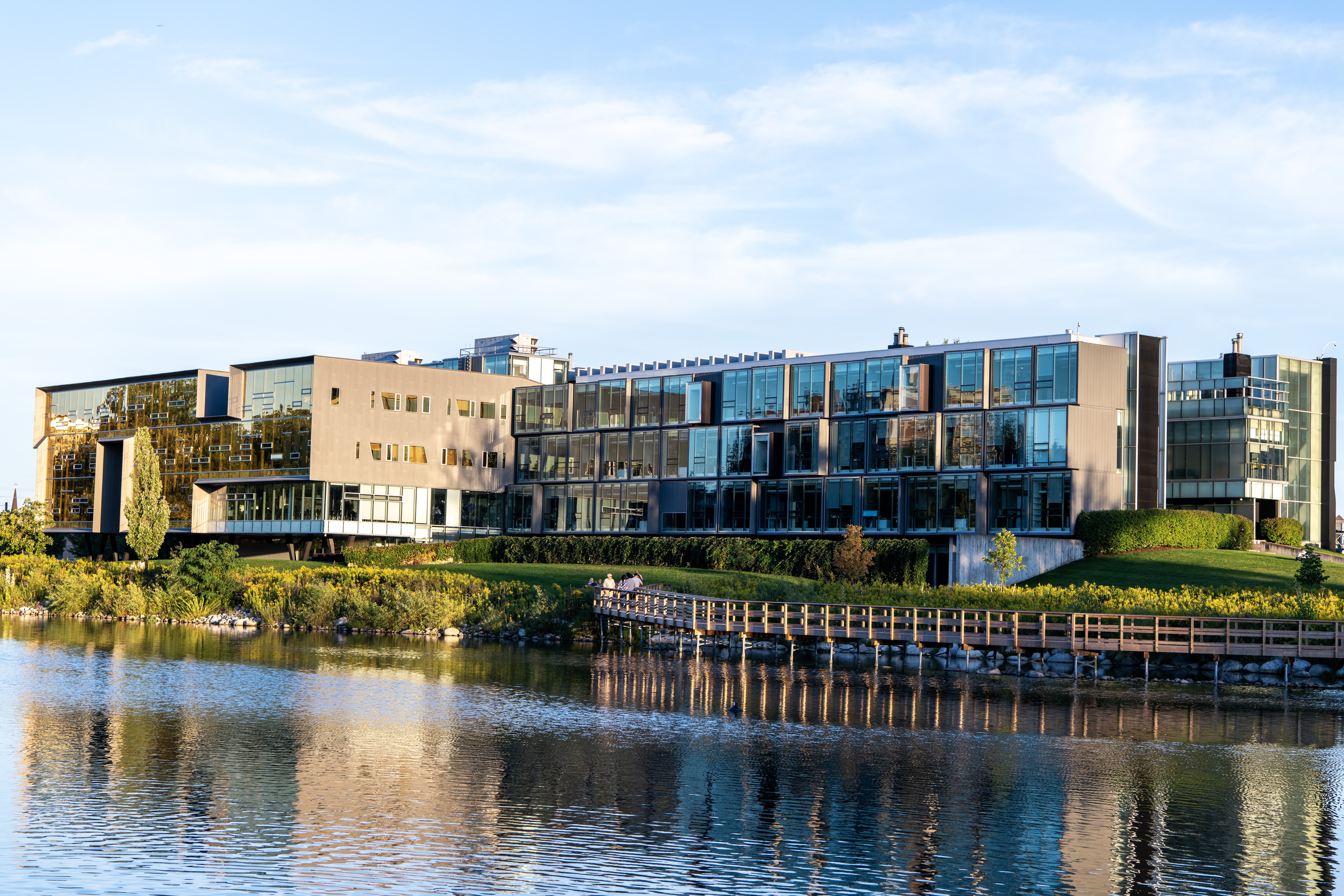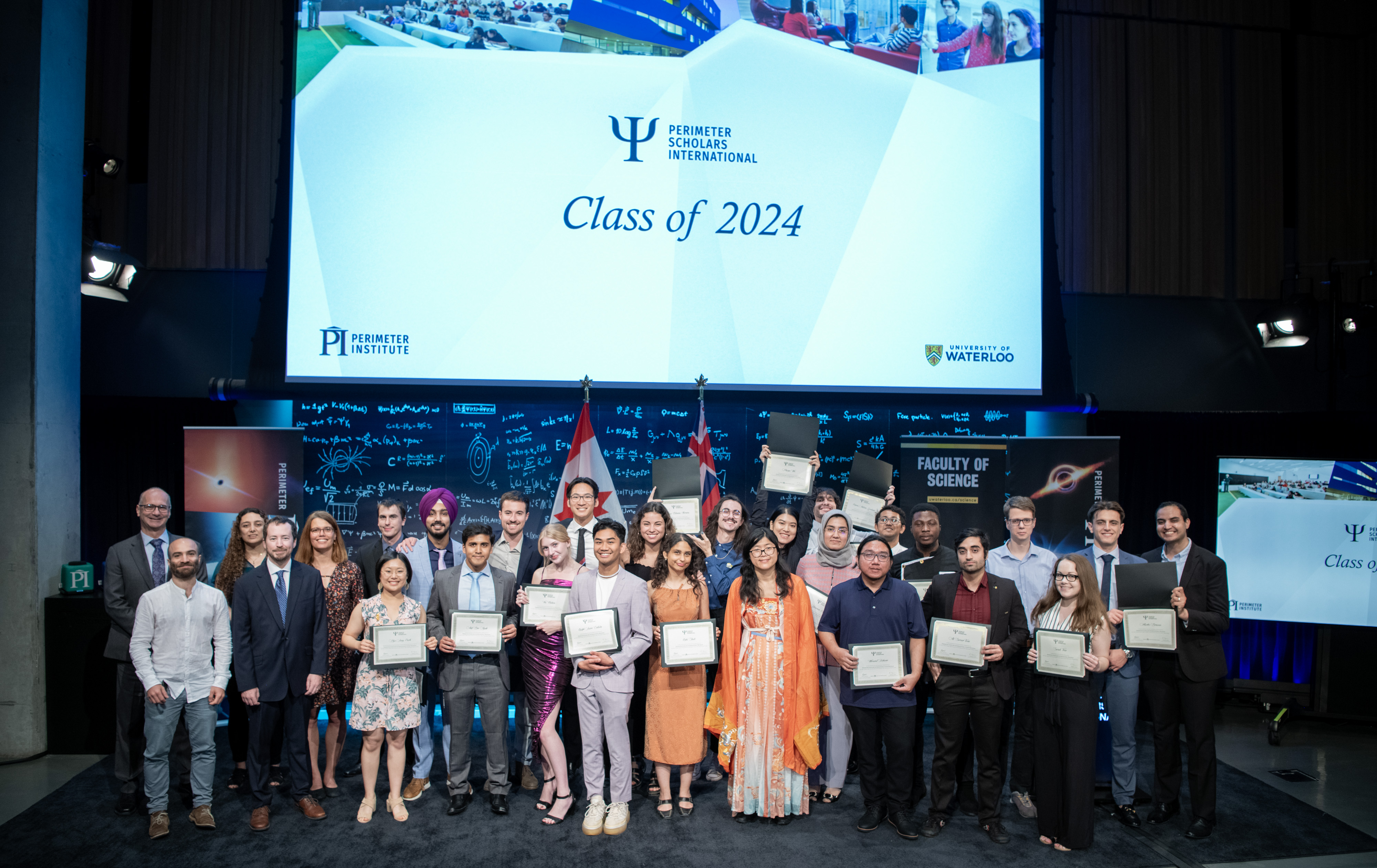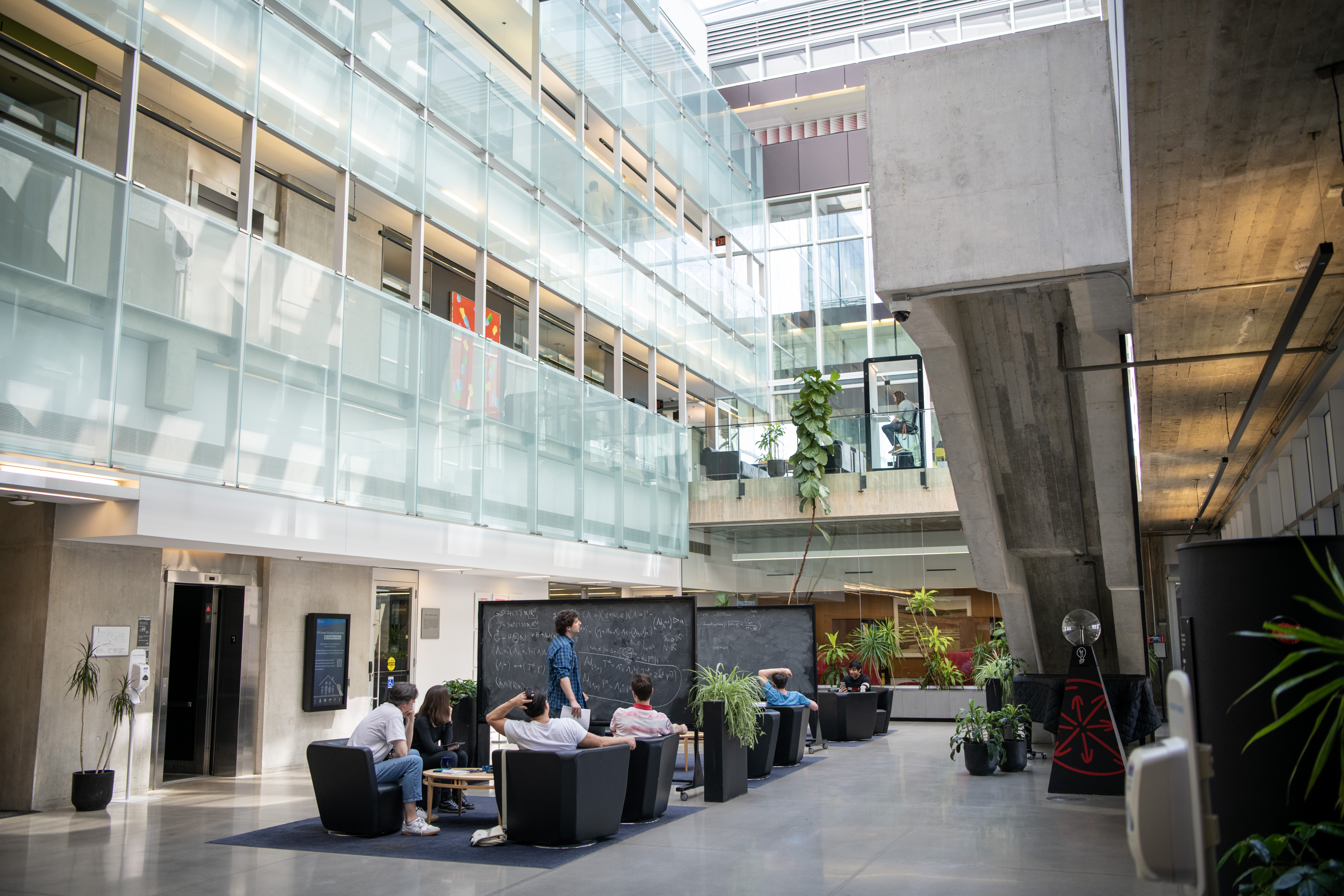Every year, Perimeter Institute and the University of Waterloo welcome about 25 students to Waterloo for the Perimeter Scholars International (PSI) master’s program. We chatted to both current and past PSI students for tips about the application process, making the move to Perimeter Institute in Waterloo (brace yourself for Canadian winters!), and what makes this master’s program special.
Thank you to current PSI students, Agla Thorarinsdottir and Besart Lajci, and PSI graduates (and current Resident PhD Students) Dawit Belayneh, Ifigeneia Giannakoudi, James Munday, and Raquel Izquierdo Garcia, for sharing their advice and expertise!
This conversation has been lightly edited for clarity and length.
What made you interested in applying to the PSI program at Perimeter Institute?
“I was looking for a one-year, accelerated master’s program. I wanted something where the main focus was on learning and getting to the point where I can start my PhD very strong.” – Thorarinsdottir
“I did my physics undergrad at the University of Chicago. At the end of it, I decided to take a gap year and spent the year working on experimental physics at CERN. For the whole year, I wasn’t thinking about theory at all. I was thinking about experiments. It was a really fun time, but I knew after the year ended I wanted to do theory. Perimeter is a really magical place in that it’s entirely dedicated to theory. It has incredible professors, and the PSI program is just one of the best in the world.” – Belayneh
“Coming out of my undergrad, I had a very rough idea of where I wanted to be. I wanted to be somewhere between math and physics. For PSI, you take a lot of courses – which can be both a great thing and a terrible thing depending on who you are – but you’re exposed to a lot of topics and cutting-edge research. You also have the opportunity to talk to a lot of researchers. It seemed like the perfect place to experience different topics and get a taste for everything that’s out there.” – Munday
“A friend of mine, three years ahead of me in undergrad, printed some of the Perimeter Institute’s Women in Physics posters and hung them in our university. This is how I discovered what Perimeter was. I got into the Perimeter website and remember reading an article that collected stories of women from Perimeter and explained what the research is like and what their journey as a physicist has been. Every bit of information I got about Perimeter made me realize it was the correct place for me, not only because of the physics, but because of the way Perimeter approaches research. There is a focus on doing good work while caring about diversity, caring about making a research community that is better, and letting people work in the way that they feel is for them.” - Izquierdo Garcia
What are some things you did to help you through PSI application process?
“I did a lot of research about the professors here. And PIRSA [Perimeter’s archive of recorded seminars] was a very useful website because it has all the past PSI lectures. So I got to see what professors like to think about and how they explain physics concepts. That was very useful to me.” - Belayneh
“During the process of applying, I was reading all of Perimeter’s articles, watching all the videos on the Youtube channel.” – Izquierdo Garcia
Some PSI applicants are contacted for an interview during the application process. Any advice about how to prepare for an interview?
“I was scared at first. In the email, they said they would ask a few questions related to physics. And I interpreted that as, ‘We will ask you all of physics, you must study every question.’ But I don’t think their interviews are really like that. It was very relaxing.” – Lajci
“I was given two or three minutes in the beginning to introduce a topic that I am interested in…It was a very friendly environment. It was more like a discussion. I reviewed a bit of the topics but very briefly. I wrote a text of what I was going to present and I went through it over and over and over so that I could say it. I acted like a confident person!” - Giannakoudi
“I was absolutely scared. I had never lived outside of Spain and I was very self-conscious about my English. I was very scared of not being able to solve their questions. But they were so nice and they were trying to make me share the things I love about physics and help me reason through the problems. They mostly want to see how you reason and how you think out loud in physics. This is very necessary in the PSI program because it’s very collaborative.” - Izquierdo Garcia
You’ve received your acceptance letter to PSI, and are set to move to Waterloo for your year of study. How should students prepare for their first few months of PSI?
“You can prep a little bit, but don’t go too far with it. Don’t do PSI before PSI.” – Lajci
“I would study just a bit to get an introduction, because PSI is a very fast-paced and intense program…Winter is going to be tough. Don’t underestimate the winter and lack of sun – you have to find ways to cheer yourself. My number one advice would be to find a hobby at PSI. It will have a huge impact on your psychology.” – Giannakoudi
“It’s going to take some time to adjust in the beginning. It’s ok if not everything makes sense…There’s almost certainly going to be people in your class who are better at certain things than you are. Just having that understanding that it’s not a problem, it’s just that you have different experiences and are at different stages in different subjects. Some people have more experience with research, some people know quantum field theory by heart.” - Munday
“One of the nicest things about PSI is that the people running it really care about the students and make you feel at home, even if you are very far from home. Since Perimeter doesn’t have undergrads, PSI are the kids of this family. So everyone is taking care of the PSI students.” – Izquierdo Garcia
What makes the learning environment in PSI so unique?
“The group dynamic of 25 people versus a big cohort is really unique, and the main emphasis here is on learning. I feel like in the past, with coursework, I usually learned things on my own to study for an exam. Here, I’ve learned more through other people and the collaborative environment. I think it’s more productive, and I feel like I’ve learned so much more here than doing typical exams.” – Thorarinsdottir
“PSI doesn’t have exams with grades. There is the grade of you pass the course or you don’t pass the course. I think that is magical. I came from a 5-year program in which exams were very hard. I was very burned out of having to prepare for exams. Coming here and seeing that it is possible to have a class in which there is no competition among peers, the program really helps you understand that the way to get the most out of it is by collaborating and learning physics with other people, and not just learning physics by yourself. I think that is a unique experience.” – Izquierdo Garcia
“The nice thing about PSI is it gives you multiple options, even as a PSI student, to experiment with different research directions. This is very rare in other institutions. You tend to be localized within a particular sub-discipline, and it’s difficult to move around.” – Belayneh
Any last parting advice for PSI hopefuls?
“Be yourself. That is my best advice…The PSI application process is holistic, so don’t worry too much about having the perfect ‘statistics’.” – Lajci
“Sleep during the first month of PSI!” – Giannakoudi
“Life outside of PSI is equally as important to being successful, happy, and well-adjusted. One of the things that really helped me be happy here was finding an activity outside of PSI. A good number of people from the PhD students go to gyms, and that gives you a sense of connection to the city.” - Belayneh
“It is free to apply, they help you with the application, they very clearly say what you have to do. So just apply. If you read the description and think it’s something good for you – then just apply.” – Izquierdo Garcia
À propos de l’IP
L'Institut Périmètre est le plus grand centre de recherche en physique théorique au monde. Fondé en 1999, cet institut indépendant vise à favoriser les percées dans la compréhension fondamentale de notre univers, des plus infimes particules au cosmos tout entier. Les recherches effectuées à l’Institut Périmètre reposent sur l'idée que la science fondamentale fait progresser le savoir humain et catalyse l'innovation, et que la physique théorique d'aujourd'hui est la technologie de demain. Situé dans la région de Waterloo, cet établissement sans but lucratif met de l'avant un partenariat public-privé unique en son genre avec entre autres les gouvernements de l'Ontario et du Canada. Il facilite la recherche de pointe, forme la prochaine génération de pionniers de la science et communique le pouvoir de la physique grâce à des programmes primés d'éducation et de vulgarisation.


